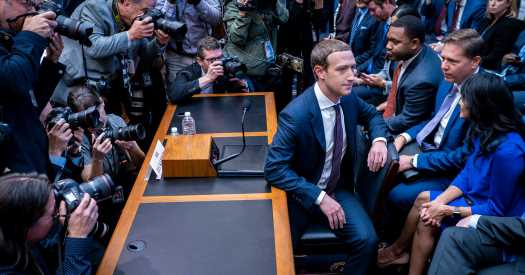WASHINGTON — Mark Zuckerberg, Facebook’s chief executive, returned to the hot seat on Wednesday to defend a cryptocurrency project that has become the latest target of criticism from lawmakers frustrated with the social media giant.
He ended up defending Facebook on a range of issues, from political advertising to housing discrimination and child pornography.
In a hearing before the House Financial Services Committee, Mr. Zuckerberg presented a rosy view of how the cryptocurrency would provide a safe way for millions of Americans without bank accounts to exchange money affordably.
And in a response to an outcry from financial regulators, he said Facebook would not offer Libra, its cryptocurrency initiative, anywhere in the world “unless all U.S. regulators approve it.”
Lawmakers have been unsparing in their criticism of Libra and Facebook’s leader. On Wednesday morning, they also took the opportunity to call Mr. Zuckerberg on the carpet for its many issues of the last three years.
Representative Maxine Waters, the committee chairwoman, set the tone of the meeting early. She grilled Mr. Zuckerberg on the company’s political ads policy, Facebook’s willingness to allow virtually unfettered speech across the platform and the company’s shifting positions on how it wished to treat so-called blockchain advertising and technology across its services.
“The impact of this will be a massive voter suppression effort. Your claim to promote freedom of speech does not ring true,” she said.
Ms. Waters started the hearing with an opening statement that also touched on the company’s continued problems with foreign election interference, privacy violations, its poor record on work force diversity and allegations of housing discrimination from its ads platform.
Committee members said Facebook faced a credibility crisis. Representative Nydia M. Velázquez, a Democrat from New York, pointed to Facebook’s promise in its acquisition of WhatsApp in 2014 to keep the messaging app separate from the main Facebook platform. But a few years later, Mr. Zuckerberg announced it would merge data between the two apps.
“Do you understand why this record makes us concerned with Facebook entering the cryptocurrency space? Have you learned that you should not lie?” Ms. Velásquez said.
Mr. Zuckerberg was defensive. “Congresswoman, I would disagree with the characterization,” he said before getting cut off again by further questions.
Representatives homed in on issues of national security, and the ways that bad actors have used cryptocurrencies to pursue illicit activity.
“You’re creating a whole new currency, which could be anonymous, that could create a whole new threat to Americans and national security, which is a huge concern,” said Representative Carolyn Maloney, Democrat of New York.
Representative Ann Wagner, a Republican from Missouri, said she was troubled by Facebook’s history of dealing with child pornography on the site. The company has reported discovering millions of exploitative images and videos.
“You are not working hard enough and end-to-end encryption is not going to help the problem,” Ms. Wagner said.
Mr. Zuckerberg acknowledged the difficulties of policing a global platform, but was again defensive as he was challenged on his company’s ability to respond to the proliferation of images on Facebook.
”We work harder than any other company to identify this behavior,” Mr. Zuckerberg said.
A torrent of criticism has been directed toward Facebook’s cryptocurrency effort since it was announced in June. But Mr. Zuckerberg, who is personally fascinated by cryptocurrencies, is committed to the project.
In the past week, Facebook officials have been on a charm offensive with regulators and lawmakers, leading up to the hearing on Wednesday. And Mr. Zuckerberg has taken on a more assertive role in defending the social network in Washington in recent weeks.
Facebook has one of the biggest influence operations in Washington and has fortified its lobbying in response to the increased government scrutiny this year. The company is on track to spend $12.3 million to lobby the federal government in the first nine months of the year, compared with $12.6 million for all of last year, according to public filings.
But the financial industry and tech companies are growing increasingly leery of the cryptocurrency project. Facebook originally brought on 27 partners to join a Libra Association in Switzerland that is supposed to govern the network. But several big-name partners, including PayPal, Mastercard and Visa, have dropped out.
Mr. Zuckerberg described Libra as a democratizing financial system that would benefit mostly poor consumers, as well as the estimated 14 million people in the United States who do not have access to bank accounts and who cannot afford banking fees.
“People pay far too high a cost — and have to wait far too long — to send money home to their families abroad. The current system is failing them,” Mr. Zuckerberg said in the advance version of his testimony. “The financial industry is stagnant and there is no digital financial architecture to support the innovation we need. I believe this problem can be solved, and Libra can help.”
This is a developing story. It will be updated.
Follow Cecilia Kang on Twitter: @ceciliakang
Cecilia Kang reported in Washington. Mike Isaac and Nathaniel Popper reported in San Francisco.
Interested in All Things Tech? Get the Bits newsletter for the latest from Silicon Valley. And sign up for the personal tech newsletter for advice and tips on the technology changing how you live.
Source: Read Full Article
